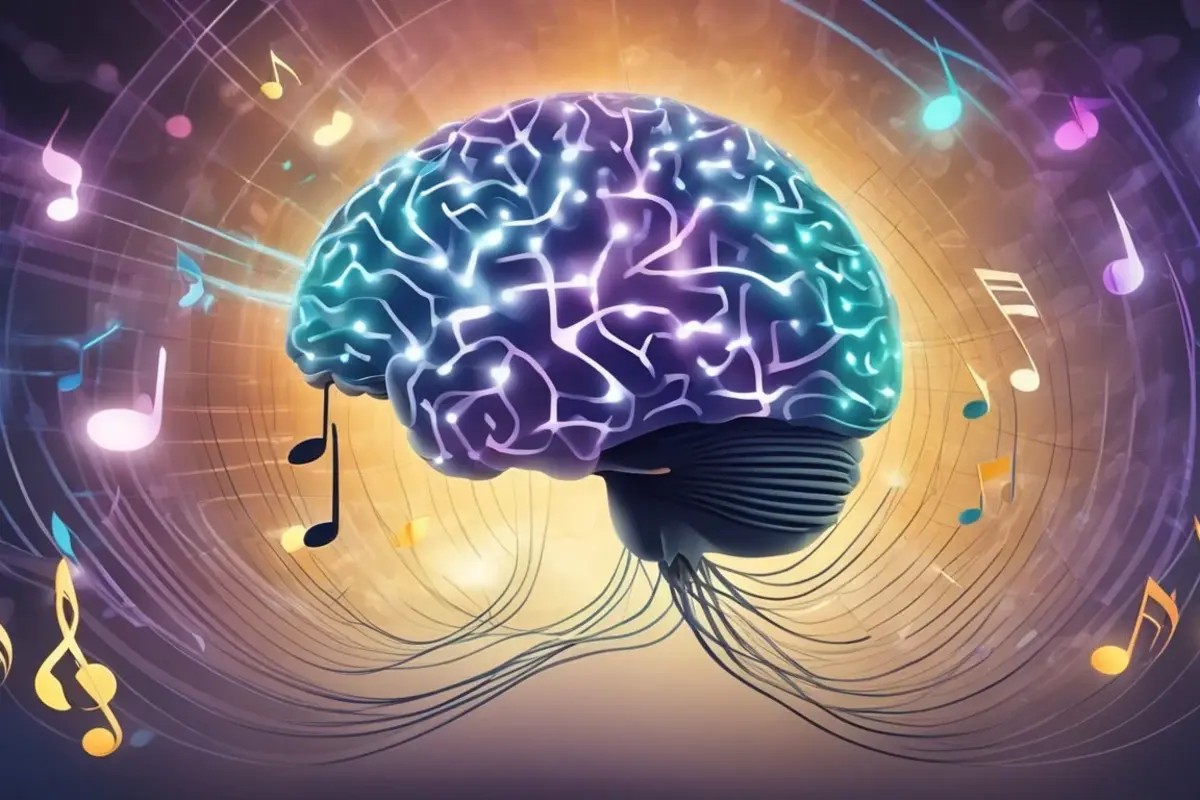or millennium, music has been woven into the very existence of the human species. In fact it has existed for longer than written history—resonating its vibrations though caves, temples, battlegrounds, festivals, and in moments of isolation. Music has the unique ability, to unite us as one, often times, more so than words alone could ever accomplish. Beyond its use as a medium for artistic expression, music has profound effects on emotions, health and behavior. This article aims to highlight how it works, and how you may be able to implement it better into your life.
Music and stress relief

There has been a significant push in recent years to expand knowledge in this area and the results are promising. By-and-large we know that music is capable of relieving stress in multiple facets, from depression and anxiety to burnout. Music is a powerful tool to implement into your day-to-day life. This means that you can utilize this to hack your brain into being more calm and relaxed. For those who haven’t attempted to implement music into their lives in this capacity, play it by ear, it may just strike a chord, and you might change your tune.
Reduced cortisol levels
A recent 2021 study indicated that adults who listened to both personal and neutral selections of music, at home and in a laboratory environment, had significantly “reduced cortisol levels” (cortisol is the body’s natural stress hormone). This finding was established regardless of the music type.
Reduced burnout
For those who are feeling the mental toll that comes with working long hours, you may find that listening to music reduces feelings of burnout. A 6-week study of operating room staff found that after having access to 30-minute music listening sessions each day for a month, staff reported decreased stress levels and less emotional exhaustion. It should be noted that the musical repertoire used was varied to satisfy all the participants' preferences.
Music and physical health
Our bodies are so in-tune with music that it is actually capable of influencing our physical well-being through numerous biological pathways. Things such as enhanced athletic performance, improvement of immune system function, or even accelerated healing and rehabilitation across a range of medical conditions are only a few of the potential effects music can have on us, physically.
Enhanced athletic performance
Did you know that studies show that listening to music can turn you into a superhero? Well, not really…but kind of! Any athlete knows that listening to their favorite jam can help them go the extra mile during their workout—the science seems to sing the same tune.
Time and time again, study after study has shown that faster-paced music tends to help improve athletic performance when a person engages in low-to-moderate level exercise, either by increasing distance travelled, pace, or repetitions completed. For example, a 2006 study that looked at the effect of music on the selection of treadmill speed found that while listening to fast-paced music, participants increased their pace and distance travelled without becoming more tired.
Several studies have shown how the exact tempo, as measured in beats per minute, affects one’s level of exercise. A 2011 study showed that in order to achieve the best performance for cycling (which was calculated by measuring exercise intensity through heart rate), the preferred tempo is between 125 and 140 beats per minute (bpm). A study published in 2014 showed that the best music tempo for enhanced performance on the treadmill is between 123 and 131 bpm. A plausible reason for why different types of exercise have different ideal tempos is related to one’s ability to keep time with the beat of the music, synchronizing strides or pedaling to the beat of the music.
Enhances immune function
Many of the aforementioned benefits may ring a bell as they are typically more well established and well known aspects of listening to music but something you may not know is that music is capable of enhancing our immune system—how fascinating is that?
In clinical trials, participants who listened to relaxing music for 30 minutes showed a temporary increase in salivary IgA levels, which help defend the respiratory tract against infections. Similarly, NK cell activity—a key factor in fighting viral infections and cancer cells—was found to increase after engaging in active music-making, such as drumming or singing in groups
Music, memory, & cognition

Music is deeply entwined with our memory and cognition—so much so, in fact, that listening to music actually activates more parts of the brain than any other activity!
Enhanced memory
If you’ve ever used a melody to help you recall a song, there's a good reason why that tends to do the trick. This method works because music engages multiple areas of the brain simultaneously, making the information easier to encode, store, and retrieve. Studies have shown that music, especially classical music, can enhance memory retention and recall. This phenomenon, often referred to as the “Mozart Effect,” suggests that listening to music composed by Mozart can temporarily enhance spatial-temporal reasoning, a type of intelligence that is used in tasks involving space, time, and numbers.
Parkinson's and Alzheimer's
For neurodegenerative diseases such as Alzheimer’s or Parkinson’s, music offers more than nostalgia—it provides neural support. A study of Alzheimer’s patients found that when they listened to familiar music, there was increased brain connectivity in regions otherwise compromised by the disease.
Another study examining background music in Alzheimer’s-type dementia shows that playing stimulative, familiar music increased positive social behaviors and decreased agitation. Programs that allow people with dementia to connect with caregivers through music (singing together, playing simple instruments) also report reductions in neuropsychiatric symptoms such as anxiety, depression, and agitation.
Enhanced focus
Many people enjoy listening to music while they study or do work. Conversely, other people find it to be a hindrance to their focus. It can be a bit of a double-edged sword that way. Recent research shows preferred background music (music that you enjoy) increases task-focus in sustained attention tasks by decreasing mind wandering. In a study involving students, those who worked with background music of their choosing spent a higher proportion of their time in focused states compared with more silent atmospheres.
Music and social connection

Humans are social beings—we always have been together and we always will be. From tribal drumming and church choirs to concerts and karaoke nights, shared musical experiences create a sense of unity that transcends words. Singing, dancing, or even just listening together releases feel-good chemicals like oxytocin—the same hormone that builds trust and connection.
In everyday life, this means that music can strengthen relationships in subtle ways. Couples often form “their song,” families share playlists that become part of their traditions, and friends bond over concerts or long car rides filled with their shared favorites. Even in moments of grief or hardship. Collective singing and communal listening offer comfort that silence simply can not. Music connects us not only to others, but also to something larger than ourselves.
The dark side of music
While music is a powerful ally, it isn’t always positive. Like any psychological tool, it depends on how and why we use it. For instance, listening to sad or angry music when you’re already upset can sometimes deepen the mood rather than help you release it. Similarly, loud or chaotic music can increase tension, raise heart rate, or disrupt sleep.
Music can also become a form of avoidance. If you constantly rely on it to escape silence or suppress emotion, it may prevent you from processing what you truly feel. The goal isn’t to use music as a shield, but as a mirror—a way to engage, reflect, and regulate rather than to numb out.
Ultimately, awareness is key. Pay attention to how different genres affect your body and mind. Music should enhance your state, not trap you in it.
How to use music to hack your life
1. Create purpose-driven playlists
Build playlists that match specific goals—one for relaxation, one for focus, one for motivation. That way, music becomes a tool, not just background noise.
2. Match tempo to task
Fast, upbeat songs work great for workouts or cleaning, while slower, softer music helps you wind down or reflect. You can literally “train” your mood and energy level to the beat.
3. Use music for transitory phases
Music can mark the end of one mental state and the beginning of another—like switching from work mode to rest mode, or from anxiety to calm. Over time, your brain learns these cues automatically.
4. Share music with others
Listen together, sing, or play. Music experienced socially multiplies its benefits, reinforcing connection, empathy, and shared emotion.
5. Balance music with silence
Just as important as sound is the absence of it. Give your brain quiet moments to reset—music should compliment, not replace, stillness.
The last note
At the end of the day, music is more than just entertainment—it’s a universal language and a powerful tool for reshaping how we feel, think, and connect with others. Whether you use it to calm your nerves, sharpen your focus, heal your body, or strengthen relationships, music has the ability to “hack” your psychology in ways few other things can. The key is to listen with intention: tune into the rhythms that lift you, reflect on the melodies that ground you, and share the songs that bring you closer to others. Like a well-composed symphony, your life becomes richer when you learn not just to hear the music, but to truly use it.















